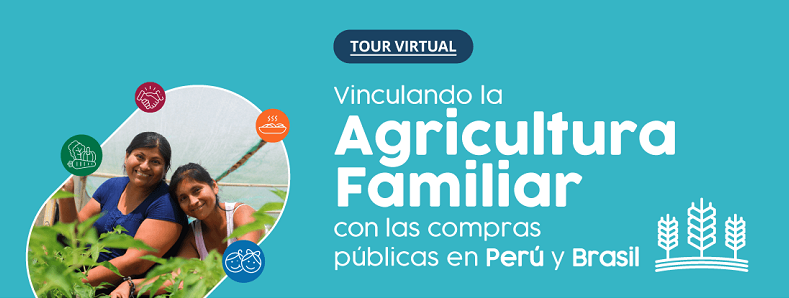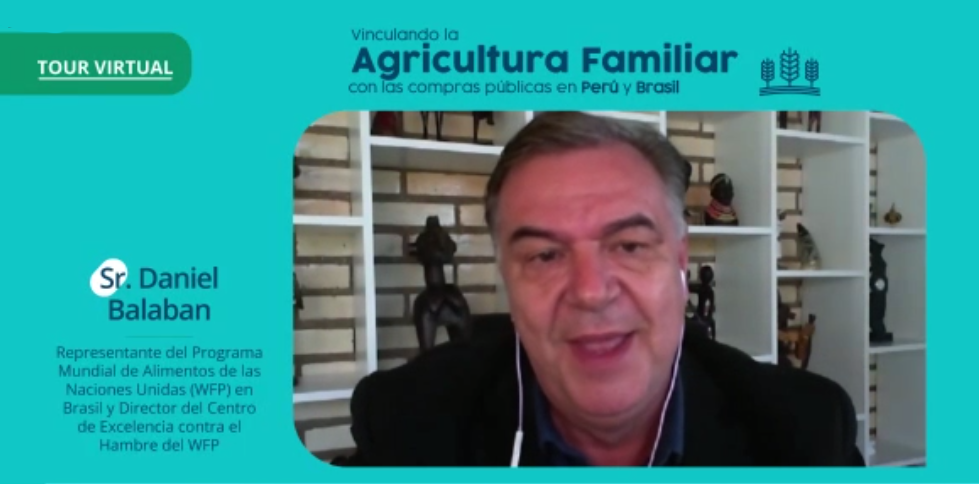
On May 11th and 13th, more than 100 people participated in the Virtual Tour “Linking family farming to public purchases in Peru and Brazil”. The purpose of the event was to promote a space for South-South Cooperation between the Peruvian and Brazilian governments to share knowledge, good practices and lessons learned in the development of local school feeding programmes. Specialists from the Brazilian Cooperation Agency (ABC), the National Fund for Education Development (FNDE) and the Secretariat of Family Agriculture and Cooperatives of the Ministry of Agriculture, Livestock and Supply (SAF/MAPA) presented the country’s success model for the purchase of foods from local farmers for school meals.
“The Brazilian National School Feeding Programme is a robust state policy, with an extensive legal framework based on the right to education and adequate and healthy food at school. In the context of the pandemic, this solidity and intersectoriality were key to guaranteeing food security for students”, said Karine Santos, Coordinator of the National School Feeding Programme (PNAE). Technicians from the Brazilian government highlighted the importance of intersectoral action, reaching health, family farming, the economy and education. “It is a collective process that involves federal and state public managers, the person who will be there at the end of the process, including the nutritionists who will prepare the menus and who need to have a constant dialogue with the local agriculture. Everyone needs be interconnected for the success of the policy”, said Mateus Rocha, General Coordinator of Market Access (SAF/MAPA).
Peruvian leaders from the Ministries of Agrarian Development and Irrigation (MIDAGRI) and Development and Social Inclusion (MIDIS) detailed some key aspects of the Peruvian family farming system, the new legal framework and the barriers to be faced when promoting local production in public purchases. Peru also presented its National School Meals Programme, called Qali Warma, and its two experiences supported by WFP and FAO on this topic, strongly influenced by the Brazilian model.

“The Brazilian case directly inspired the development of the School Feeding Programme in Peru, with a focus on the right to adequate food, the multicultural aspect, and very strong articulation with local communities. The model of the Food Monitoring Committees, for example, is directly inspired by the Brazilian model”, said Fanny Montellanos Carbajal, Vice Minister of Social Protection of Peru.
The activity was organized by WFP Peru, with the support of the WFP Centre of Excellence Against Hunger Brazil and the WFP Regional Office in Panama. The event marked the final phase of a series of virtual exchanges within the project “Promoting the Participation of Small and Medium Farmers in Public Procurement to Improve Nutrition for Schoolchildren in Peru”.
At the end of the event, the Director of the WFP Centre of Excellence against Hunger Brazil, Daniel Balaban, highlighted the innovation of this type of virtual technical cooperation. “The current context of the pandemic does not allow us to be together in person, sharing these experiences in the field. This tour that we did in the last few days allowed us to dive into the Brazilian and Peruvian programs in a way that I believe has never been done”, said Daniel Balaban. “In all my years working with school meals, this is the first time that I participate in an exchange of government experiences in a totally virtual way. I hope to see many more exchanges in this format in the future.”.
This South-South Cooperation initiative, which launched in April 2020, is implemented in coordination with the International Fund for Agricultural Development (IFAD) and the United Nations Food and Agriculture Organization (FAO).




